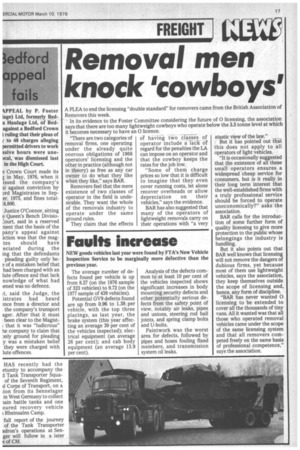Removal men knock 'cowboys'
Page 19

If you've noticed an error in this article please click here to report it so we can fix it.
A PLEA to end the licensing "double standard" for removers came from the British Association of Removers this week.
In its evidence to the Foster Committee considering the future of 0 licensing, the association says that there are too many lightweight cowboys who operate below the 3.5 tonne level at which it becomes necessary to have an 0 licence.
"There are two categories of removal firms, one operating under the already quite onerous obligations of 1968 operators' licensing and the other in practice (although not in theory) as free as any car owner to do what they like when they like," says BAR.
Removers feel that the mere existence of two classes of operator in the field is undesirable. They want the whole of the removals industry to operate under the same ground rules.
They claim that the effects of having two classes of operator include a-Tiek Of regard for the penalties the LA can impose on an operator and that the cowboy keeps the rates for the job low.
"Some of them charge prices so low that it is difficult to imagine that they even cover running costs, let alone recover overheads or allow depreciation on their vehicles," says the evidence.
BAR has also suggested that many of the operators of lightweight removals carry on their operations with "a very elastic view of the law."
But it has pointed out that this does not apply to all operators of light vehicles.
"It is occasionally suggested that the existence of all these small operators ensures a widespread cheap service for consumers, but is it really in their long term interest that the well-established firms with a truly professional service should be forced to operate uneconomically?" asks the association.
BAR calls for the introduction of some further form of quality licensing to give more protection to the public whose belongings the industry is handling.
But it also points out that BAR well knows that licensing will not remove the dangers of dubious firms, yet because most of them use lightweight vehicles, says the association, they keep themselves outside the scope of licensing and, hence, any form of discipline.
"BAR has never wanted 0 licensing to be extended to cover all the thousands of tiny vans. All it wanted was that all those who operated removal vehicles came under the scope of the same licensing system and that all removers competed freely on the same basis of professional competence," says the association.




















































































































